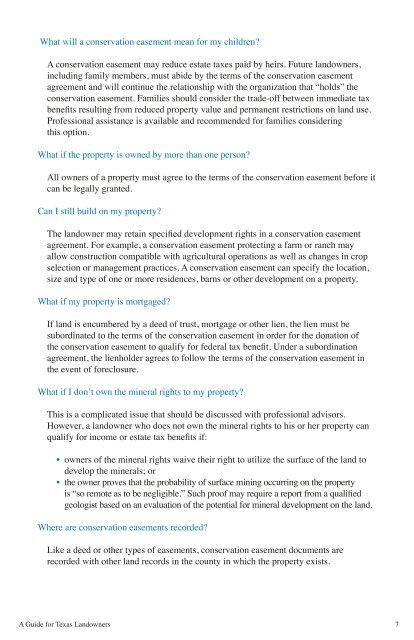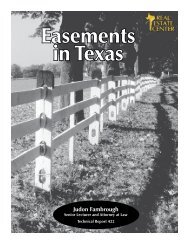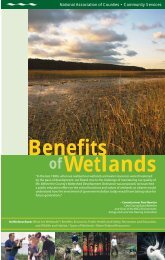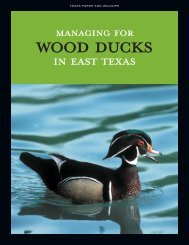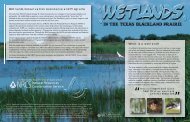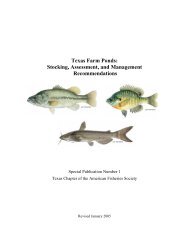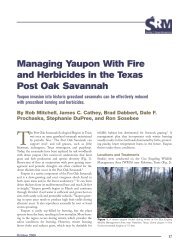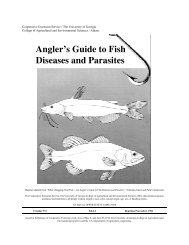Conservation Easements, A Guide for Texas Landowners
Conservation Easements, A Guide for Texas Landowners
Conservation Easements, A Guide for Texas Landowners
You also want an ePaper? Increase the reach of your titles
YUMPU automatically turns print PDFs into web optimized ePapers that Google loves.
What will a conservation easement mean <strong>for</strong> my children<br />
A conservation easement may reduce estate taxes paid by heirs. Future landowners,<br />
including family members, must abide by the terms of the conservation easement<br />
agreement and will continue the relationship with the organization that “holds” the<br />
conservation easement. Families should consider the trade-off between immediate tax<br />
benefits resulting from reduced property value and permanent restrictions on land use.<br />
Professional assistance is available and recommended <strong>for</strong> families considering<br />
this option.<br />
What if the property is owned by more than one person<br />
All owners of a property must agree to the terms of the conservation easement be<strong>for</strong>e it<br />
can be legally granted.<br />
Can I still build on my property<br />
The landowner may retain specified development rights in a conservation easement<br />
agreement. For example, a conservation easement protecting a farm or ranch may<br />
allow construction compatible with agricultural operations as well as changes in crop<br />
selection or management practices. A conservation easement can specify the location,<br />
size and type of one or more residences, barns or other development on a property.<br />
What if my property is mortgaged<br />
If land is encumbered by a deed of trust, mortgage or other lien, the lien must be<br />
subordinated to the terms of the conservation easement in order <strong>for</strong> the donation of<br />
the conservation easement to qualify <strong>for</strong> federal tax benefit. Under a subordination<br />
agreement, the lienholder agrees to follow the terms of the conservation easement in<br />
the event of <strong>for</strong>eclosure.<br />
What if I don’t own the mineral rights to my property<br />
This is a complicated issue that should be discussed with professional advisors.<br />
However, a landowner who does not own the mineral rights to his or her property can<br />
qualify <strong>for</strong> income or estate tax benefits if:<br />
• owners of the mineral rights waive their right to utilize the surface of the land to<br />
develop the minerals; or<br />
• the owner proves that the probability of surface mining occurring on the property<br />
is “so remote as to be negligible.” Such proof may require a report from a qualified<br />
geologist based on an evaluation of the potential <strong>for</strong> mineral development on the land.<br />
Where are conservation easements recorded<br />
Like a deed or other types of easements, conservation easement documents are<br />
recorded with other land records in the county in which the property exists.<br />
A <strong>Guide</strong> <strong>for</strong> <strong>Texas</strong> <strong>Landowners</strong><br />
7


